11 Vendor Risk Tools for Healthcare Supply Chains
Post Summary
Vendor risk tools help healthcare organizations assess, monitor, and manage risks associated with third-party vendors to ensure compliance and protect patient data.
They safeguard patient data, ensure compliance with regulations like HIPAA, and improve supply chain resilience and operational efficiency.
Automated risk assessments, real-time monitoring, tailored compliance frameworks, and seamless integration with healthcare systems.
Censinet RiskOps™ automates workflows, tracks compliance, and provides real-time insights to streamline vendor risk management.
Common challenges include limited resources, managing multiple vendors, and adapting to evolving regulations.
By assessing needs, integrating tools with existing systems, training staff, and conducting regular performance reviews.
Healthcare organizations face increasing challenges in managing supply chain risks, especially with third-party vendors, patient data security, and compliance with regulations like HIPAA. This list highlights 11 tools that simplify vendor risk management, safeguard patient data, and ensure compliance. Key features to look for include:
- Automated Risk Assessments: Save time with pre-built templates and workflows.
- Real-Time Monitoring: Get alerts for security issues and compliance changes.
- Tailored Compliance Frameworks: Meet healthcare-specific regulations like HIPAA and HITECH.
- Integration Capabilities: Work seamlessly with EHRs, procurement systems, and more.
- Collaborative Risk Management: Enable secure communication and vendor performance tracking.
- Advanced Reporting: Generate compliance reports and risk summaries for leadership.
- Scalability: Handle growing vendor networks without sacrificing security.
HIMSS24 | Creating Cyber Resilience: Your Guide to Vendor ...
Quick Comparison
| Tool | Key Features | Integration Options | Compliance Support |
|---|---|---|---|
| Censinet RiskOps | Automated workflows, real-time tracking, cybersecurity benchmarking | EHRs, medical device systems | HIPAA, HITECH |
| LogicGate Risk Cloud | Risk scoring, supply chain mapping, incident management | Procurement tools, EHRs | HIPAA, FDA |
| Prevalent | Continuous monitoring, risk scoring, centralized document repository | Inventory management, supply chain tools | HIPAA, FDA |
| ProcessUnity | Vendor tiering, automated questionnaires, live performance tracking | EHRs, compliance systems | HIPAA, HITECH |
| Bitsight | Real-time scoring, medical device tracking, network monitoring | Broader healthcare systems | HIPAA, FDA |
| OneTrust | Risk intelligence dashboard, automated assessments, PHI protection | EHRs, API connectivity | HIPAA, HITECH |
| SecurityScorecard | Security ratings, risk trend analysis, ecosystem mapping | API framework | HIPAA |
| Archer | Clinical impact analysis, standardized workflows, medical device tracking | Healthcare systems, compliance tools | HIPAA, HITECH |
| LogicManager | Clinical operations assessment, compliance tracking, risk scoring | EHR systems | HIPAA, FDA |
| Certa | Vendor screening, automated assessments, supply chain resilience | Healthcare management systems | HIPAA, HITECH |
| Venminder | Medical device tracking, supply chain visibility, compliance documentation | FDA compliance tools | HIPAA, FDA |
These tools help healthcare organizations streamline vendor risk management, protect sensitive data, and maintain operational efficiency. Choose based on your organization's specific needs, such as scalability, integration, and compliance requirements.
Must-Have Features in Healthcare Vendor Risk Tools
When choosing vendor risk management tools for healthcare supply chains, it's crucial to focus on features that ensure security and streamline operations. Here's what to look for in a reliable solution:
Automated Risk Assessments
Healthcare organizations need tools that can automatically evaluate vendor risks in areas like security, data handling, and regulatory compliance. These assessments should follow a consistent process but remain flexible enough to handle different vendor types and risk levels.
Real-Time Monitoring and Alerts
Continuous monitoring is key to identifying security issues before they disrupt operations. The system should send instant alerts for security incidents, compliance updates, changes in risk profiles, and potential supply chain disruptions.
Tailored Compliance Frameworks
The tool must address healthcare-specific requirements, including tracking compliance with HIPAA, the HITECH Act, state-level healthcare data protection laws, and widely accepted security standards.
Integration Capabilities
Seamless integration with existing systems is essential. This ensures smooth coordination across healthcare networks, making risk management and operational workflows more efficient.
Collaborative Risk Management
Effective tools should support secure collaboration between healthcare organizations and their vendors. Features like centralized communication, shared risk assessments, document sharing, and vendor performance tracking are vital.
Advanced Reporting and Analytics
Detailed reporting is essential for monitoring vendor risk trends, preparing compliance documentation, creating risk summaries for leadership, and measuring progress in reducing risks.
Supply Chain Risk Visibility
Healthcare providers need a clear view of vendor dependencies, risks from fourth-party vendors, and overall supply chain resilience.
Scalable Assessment Framework
As vendor networks grow, the tool should scale effortlessly while maintaining thorough assessments. Features like customizable templates, automated workflows, and bulk assessment options are critical.
These features work together to build a strong vendor risk management system that safeguards patient data, supports healthcare delivery, and ensures compliance with regulations.
1. Censinet RiskOps

Censinet RiskOps is a cloud-based platform tailored for managing risks in the healthcare supply chain. It provides comprehensive visibility across key healthcare risk areas, such as vendor assessments, medical device security, and safeguarding patient data.
"Censinet RiskOps enables us to automate and streamline our IT cybersecurity, third-party vendor, and supply chain risk programs in one place. Censinet enables our remote teams to quickly and efficiently coordinate IT risk operations across our health system." - Aaron Miri, CDO, Baptist Health [1]
Key Features
Censinet RiskOps offers a range of tools designed specifically for healthcare needs:
- Automated workflows for assessing medical devices and supply chain vendors
- Real-time tracking of Healthcare and Public Health (HPH) Cybersecurity Performance Goals
- Tools for managing risks associated with protected health information (PHI)
- Research and IRB risk evaluation support
- Monitoring supply chain vulnerabilities
These features work together to strengthen the platform’s ability to safeguard healthcare supply chains.
Another standout aspect is its cybersecurity benchmarking. Erik Decker, CISO at Intermountain Health, emphasizes its importance:
"Censinet portfolio risk management and peer benchmarking capabilities provide additional insight into our organization's cybersecurity investments, resources, and overall program." [1]
Collaborative and Secure
The platform acts as a secure risk exchange, allowing healthcare delivery organizations (HDOs) and their third-party vendors to share cybersecurity and risk data safely. This collaborative model enhances the resilience of healthcare supply chains while upholding strict security measures.
With its cloud-based design, Censinet RiskOps offers centralized, real-time visualization to help healthcare organizations manage vendor risks efficiently and maintain a strong risk management framework.
2. LogicGate Risk Cloud
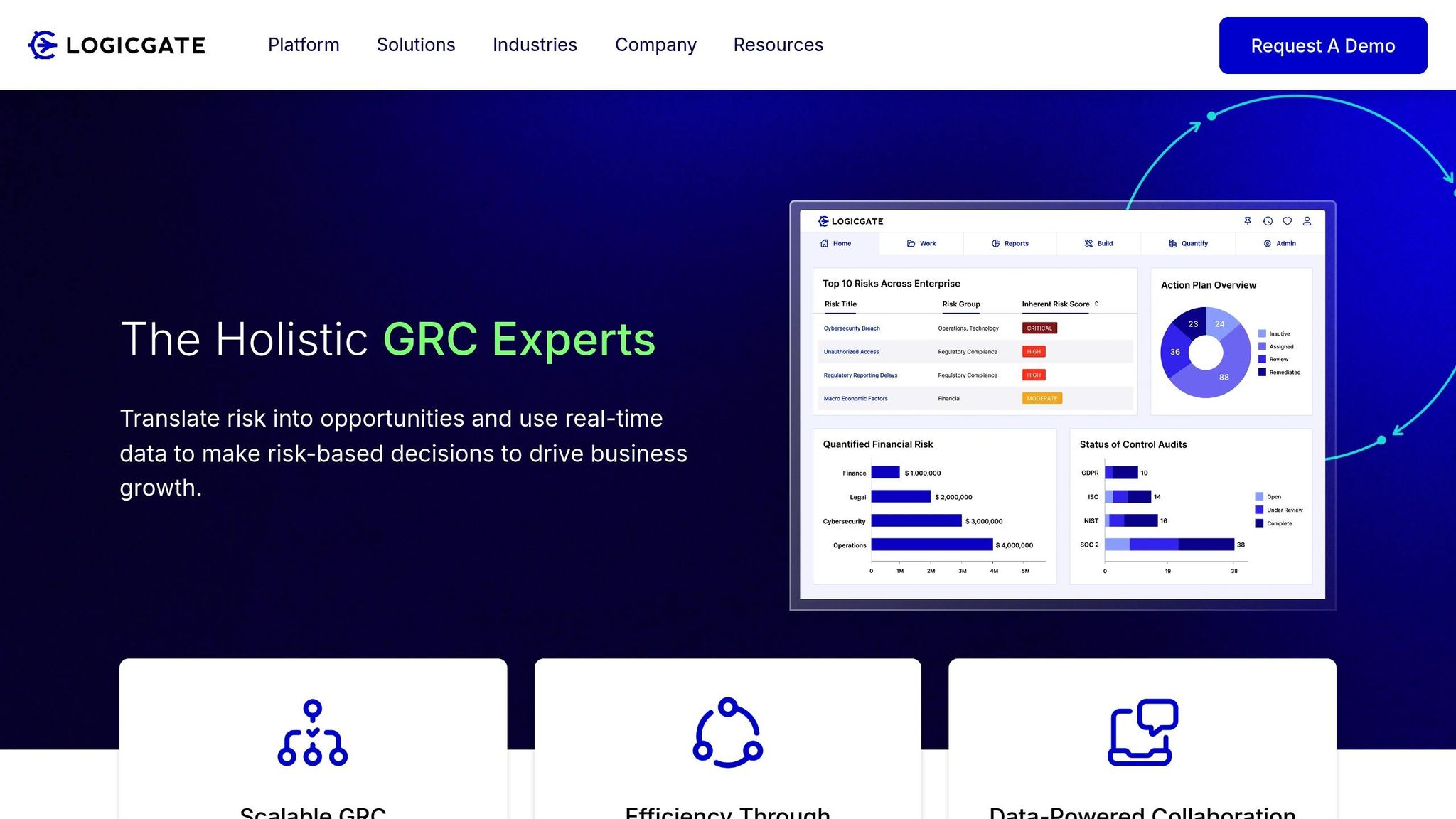
LogicGate Risk Cloud focuses on vendor risk management with an emphasis on supply chain security and regulatory compliance. It offers tools like automated assessments and ongoing monitoring of third-party vendors.
Healthcare-Specific Features
This platform is designed with healthcare supply chain needs in mind, providing:
- Compliance Templates: Pre-built templates aligned with HIPAA, HITECH, and other healthcare regulations.
- Risk Scoring: Real-time metrics to evaluate risks based on key factors.
- Document Management: Centralized storage for contracts, certifications, and other vendor documents.
- Automated Assessments: Customizable questionnaires to simplify evaluations.
- Supply Chain Mapping: Visual tools to map and understand vendor relationships.
Supply Chain Risk Controls
LogicGate Risk Cloud strengthens supply chain security with several dedicated controls:
- Vendor Tiering: Categorize vendors based on their importance and level of data access.
- Performance Monitoring: Keep track of key risk indicators and performance metrics.
- Incident Management: Log and manage supply chain disruptions effectively.
- Compliance Reporting: Automatically generate reports to meet regulatory requirements.
Integration Capabilities
The platform integrates seamlessly with various healthcare systems, including:
- Electronic Health Record (EHR) platforms.
- Medical device inventory management systems.
- Procurement tools tailored for healthcare.
- Compliance monitoring solutions.
These integration options enhance LogicGate Risk Cloud's ability to deliver automated and efficient risk management for healthcare organizations.
3. Prevalent Third-Party Risk Management
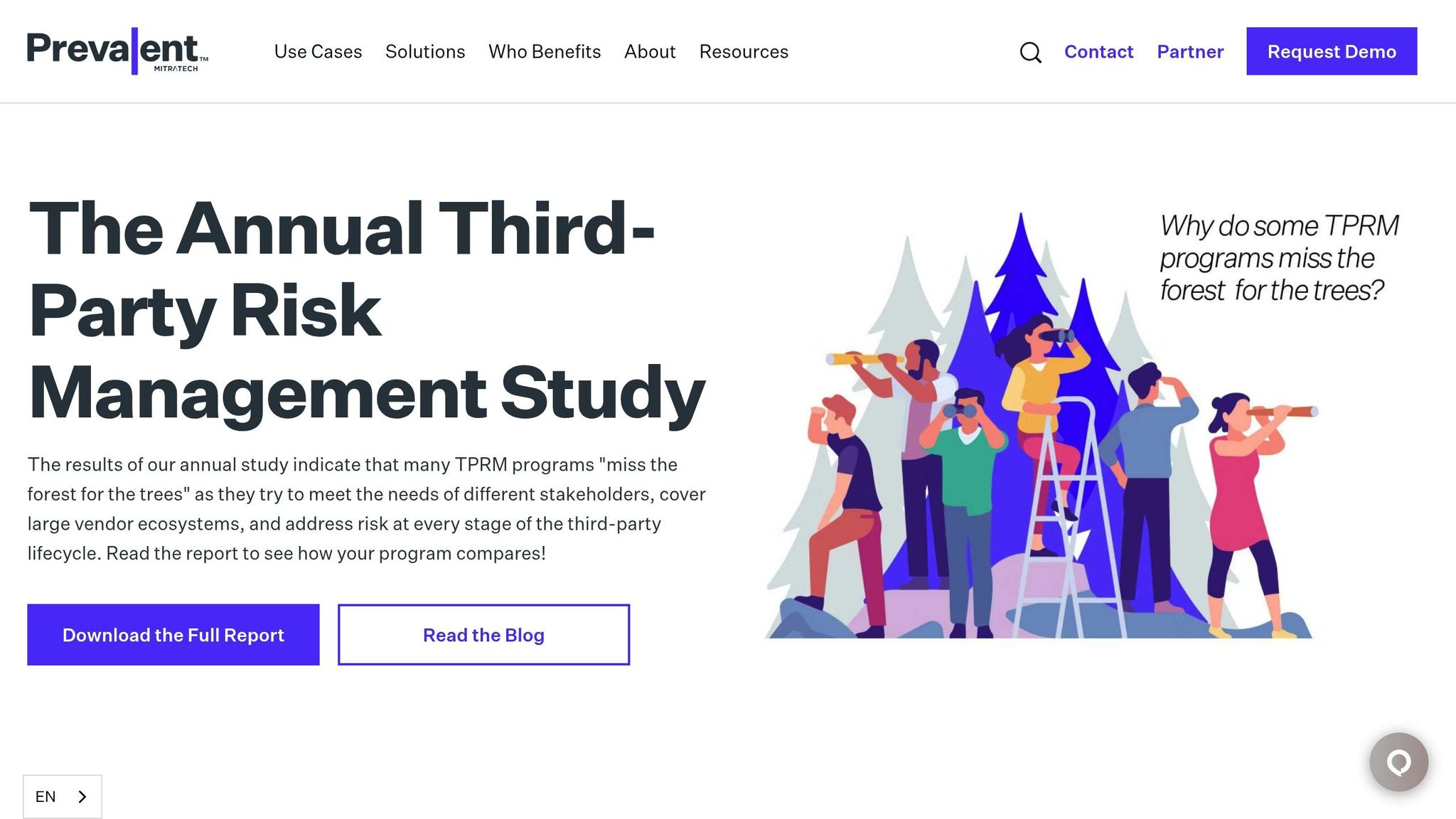
Prevalent Third-Party Risk Management offers tools designed specifically for assessing vendors and managing supply chain risks, with a focus on the healthcare sector. It strengthens the security of healthcare supply chains by combining risk controls and tailored assessments. Here's a closer look at its key features:
Healthcare Supply Chain Features
The platform provides tools to address supply chain risks effectively:
- Automated Assessment Framework: Pre-built templates tailored for healthcare-specific needs.
- Real-time Risk Monitoring: Continuous updates to track potential risks as they emerge.
- Document Repository: Centralized storage for vendor credentials and compliance documents.
- Healthcare Compliance Tools: Supports frameworks like HIPAA, HITECH, and FDA requirements.
Supply Chain Risk Controls
To safeguard healthcare supply chains, Prevalent includes these controls:
- Vendor Profiling: Evaluates supplier capabilities and identifies potential risks.
- Risk Scoring: Uses algorithms to calculate risk levels based on various criteria.
- Supply Chain Visibility: Offers insights into fourth-party relationships and dependencies.
- Incident Response: Provides workflows to manage and respond to incidents.
Healthcare Integration Options
The platform integrates seamlessly with essential healthcare systems:
- Inventory management solutions.
- Medical device tracking systems.
- Supply chain management platforms.
- Procurement systems specific to healthcare.
Risk Assessment Capabilities
Prevalent enhances supply chain security with these assessment tools:
- Continuous Monitoring: Sends alerts for any changes in vendor risk profiles.
- Compliance Tracking: Ensures vendors meet regulatory requirements.
- Risk Remediation: Provides workflows to address vulnerabilities effectively.
- Performance Analytics: Delivers reports on vendor risk metrics.
These features help healthcare organizations secure their supply chains, meet compliance standards, and maintain operational efficiency.
4. ProcessUnity Vendor Risk Management
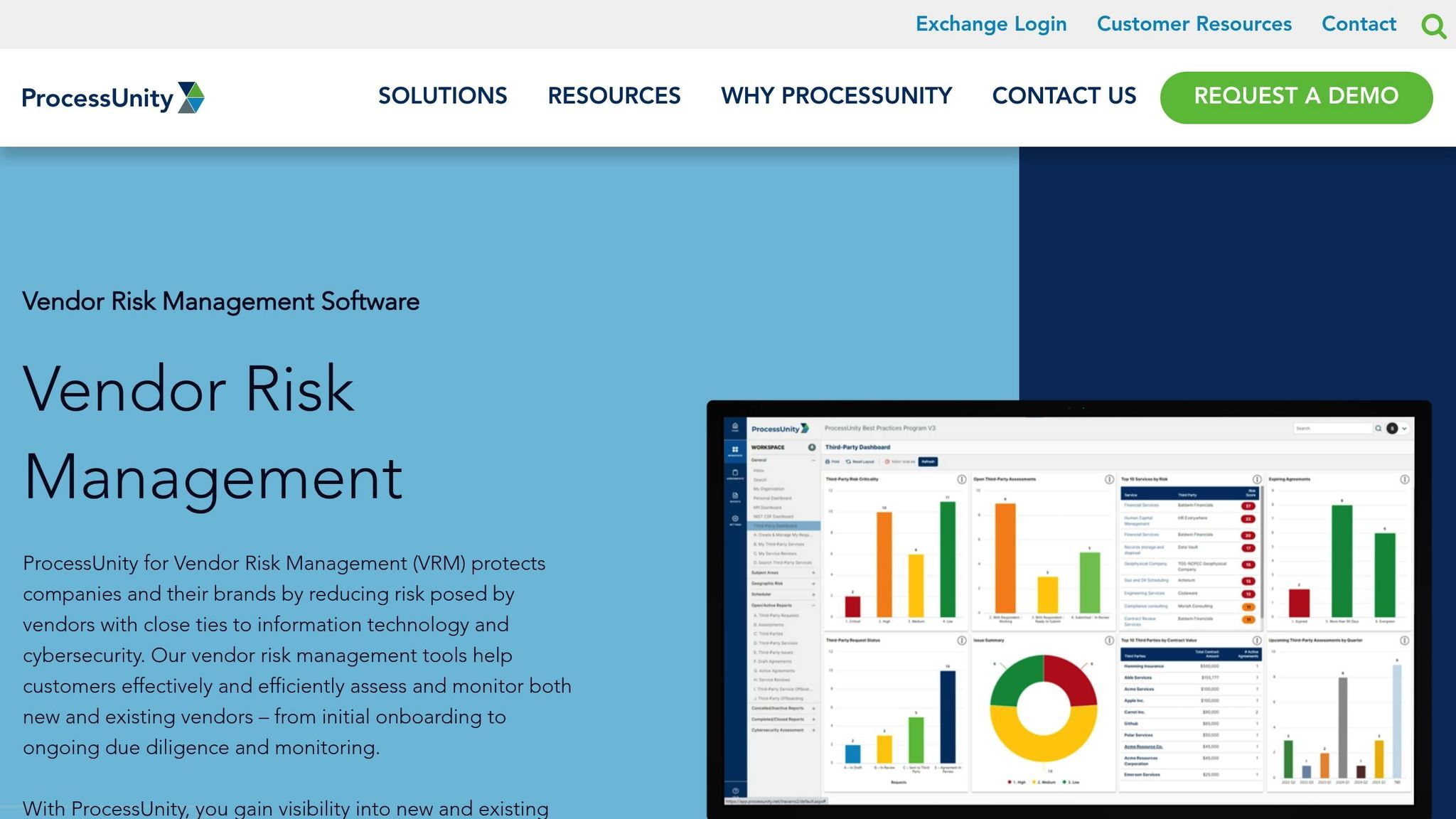
ProcessUnity Vendor Risk Management simplifies vendor evaluations and ensures healthcare supply chains stay compliant. Its features are designed to make managing risks in this industry both efficient and thorough.
Tools Tailored for Healthcare
- Custom Templates: Pre-built templates tailored for assessing medical device and pharmaceutical vendors.
- Vendor Tiering by Risk: Classifies vendors based on their access to sensitive patient data and critical systems.
- Simplified Due Diligence: Verifies vendor credentials, licenses, and certifications specific to healthcare needs.
Supply Chain Oversight
Keep a close eye on your supply chain with features like:
- Live Performance Tracking: Monitors key metrics such as delivery times, adherence to quality standards, and compliance.
- Risk Alerts: Sends notifications about potential issues like disruptions, compliance lapses, or vendor status changes.
- Centralized Document Management: Organizes and tracks certifications, insurance documents, and regulatory records in one place.
Support for Healthcare Regulations
Stay on top of healthcare compliance with these tools:
- Built-In Regulatory Support: Includes frameworks for HIPAA, HITECH, and FDA regulations.
- Compliance Tools: Offers audit trails and detailed reporting to meet healthcare standards.
Streamlined Risk Assessment
Make risk assessments more efficient with:
- Automated Questionnaires: Distributes and tracks vendor surveys with automatic reminders.
- Risk Scoring: Evaluates vendor risks using criteria tailored to healthcare.
- Improvement Tracking: Manages and monitors vendor improvement plans effectively.
5. Bitsight for Healthcare
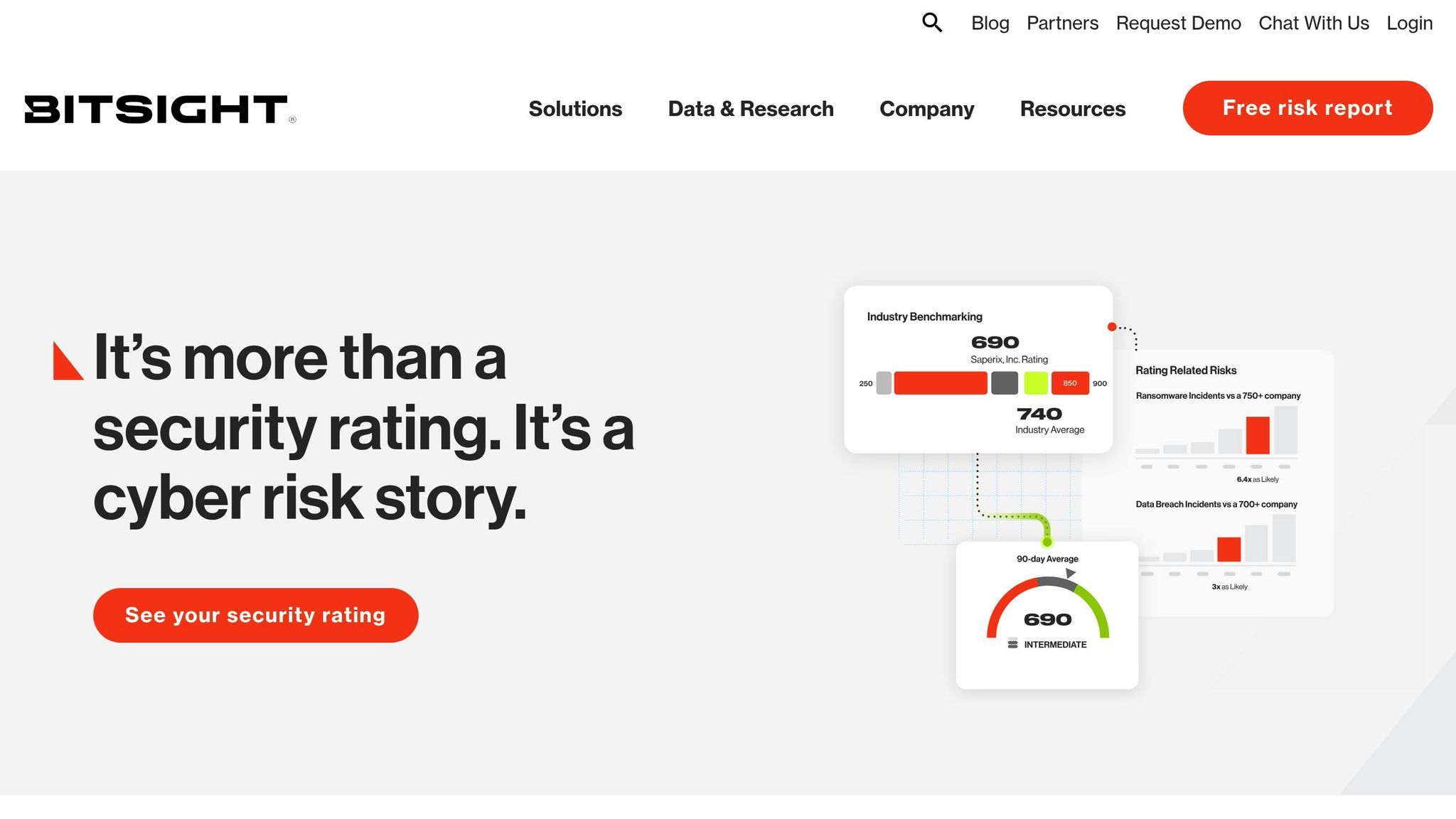
Bitsight offers tools designed to provide real-time insights tailored for healthcare organizations, focusing on securing supply chains effectively. Its features are developed to address the unique security challenges in the healthcare industry.
Healthcare Security Monitoring
Bitsight's monitoring tools are designed specifically for healthcare needs, including:
- Medical Device Tracking: Keeps an eye on connected medical devices and IoT equipment to spot security vulnerabilities.
- PHI Protection: Assesses how vendors handle and protect sensitive patient health information (PHI).
- Network Monitoring: Identifies potential security weaknesses in vendor networks that could disrupt healthcare operations.
Risk Assessment Tools
Bitsight helps evaluate vendor security with tools like:
- Real-Time Scoring: Provides dynamic security ratings based on vendor activities and incidents.
- Compliance Verification: Checks whether vendors meet healthcare industry standards and regulations.
- Risk Trend Analysis: Monitors changes in vendor security over time to detect patterns or emerging risks.
These insights directly support stronger security measures for healthcare supply chains.
Supply Chain Security Features
Bitsight enhances supply chain security with features such as:
- Centralized Visibility: Offers a dashboard view of vendor security ratings and sends automated alerts for critical updates.
- Remediation Tracking: Tracks vendors' progress in fixing identified security issues.
Healthcare Ecosystem Protection
Bitsight goes beyond assessments by integrating with broader healthcare systems to improve overall security:
- Third-Party Integration: Works with existing healthcare systems to simplify risk management processes.
- Ecosystem Mapping: Maps out vendor relationships and their effects on healthcare operations.
- Industry Benchmarking: Compares vendor performance against industry security standards to ensure accountability.
sbb-itb-535baee
6. OneTrust Third-Party Risk Management
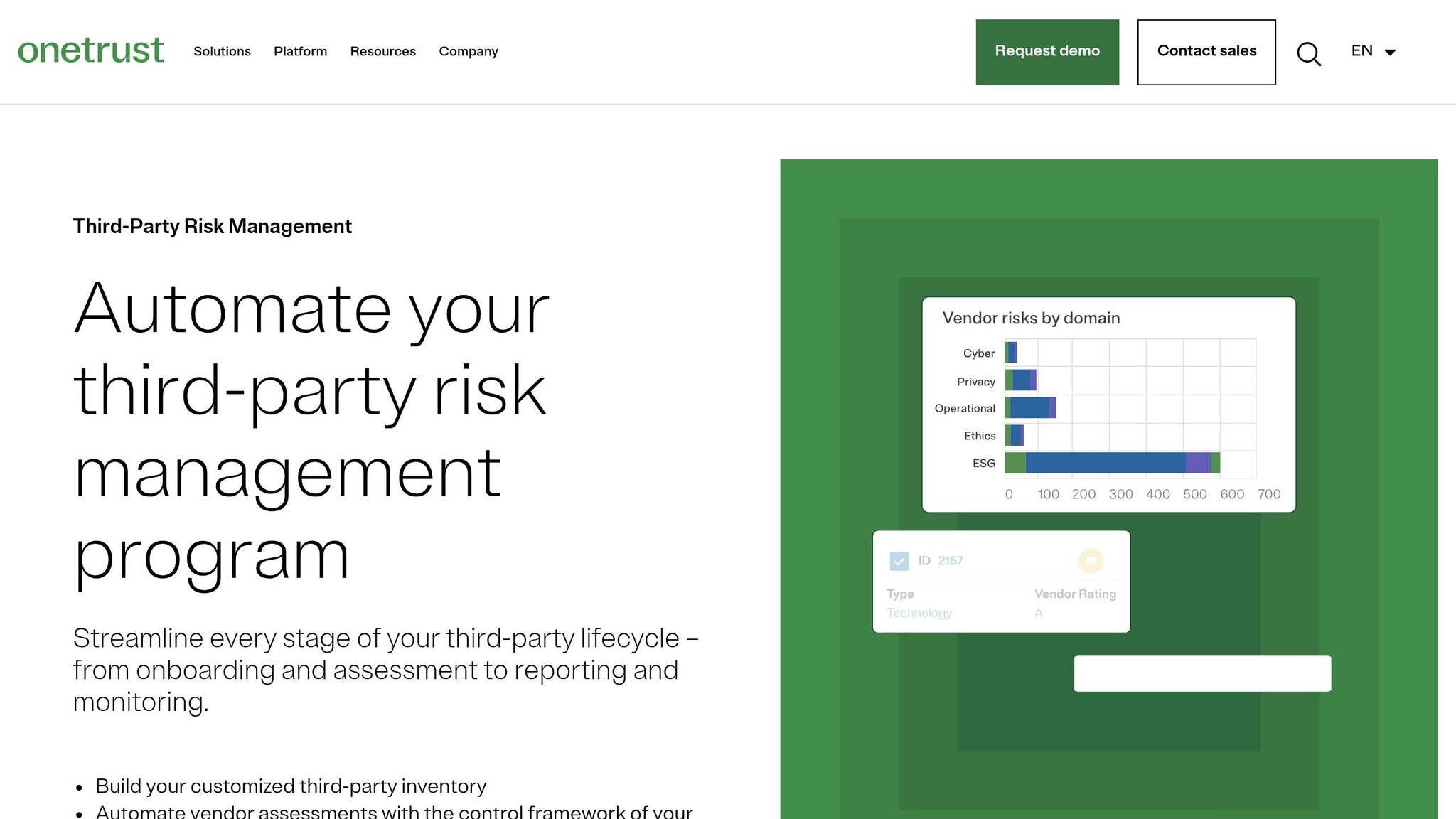
OneTrust's platform focuses on managing vendor relationships in the healthcare supply chain, offering tools tailored to secure data handling and regulatory compliance. Here's how it addresses healthcare vendor risk management with its key features:
Supply Chain Features
- Vendor Assessment Automation: Streamlines evaluations for both new and current vendors.
- Risk Intelligence Dashboard: Provides real-time updates on risk scores and compliance.
- Document Management: Consolidates vendor contracts, certifications, and compliance records in one place.
Compliance Tools
- HIPAA Compliance Tracking: Monitors adherence to HIPAA regulations.
- Regulatory Updates: Keeps organizations informed about shifts in healthcare compliance requirements.
- Audit Trail Documentation: Logs detailed records of vendor interactions and evaluations.
Risk Monitoring
- Real-Time Risk Alerts: Sends notifications about potential vendor security issues.
- Performance Metrics: Measures vendor reliability and compliance over time.
- Issue Resolution Tracking: Tracks progress on resolving identified risks.
Integration Capabilities
- EHR System Integration: Links seamlessly with electronic health record systems.
- API Connectivity: Enables data exchange with healthcare management tools.
- Custom Workflow Creation: Lets organizations design tailored risk assessment processes.
Data Protection
- PHI Protection: Ensures vendors handle protected health information in compliance with standards.
- Access Controls: Manages permissions for accessing sensitive vendor data.
- Data Encryption: Safeguards communication between healthcare organizations and vendors.
7. SecurityScorecard for Healthcare
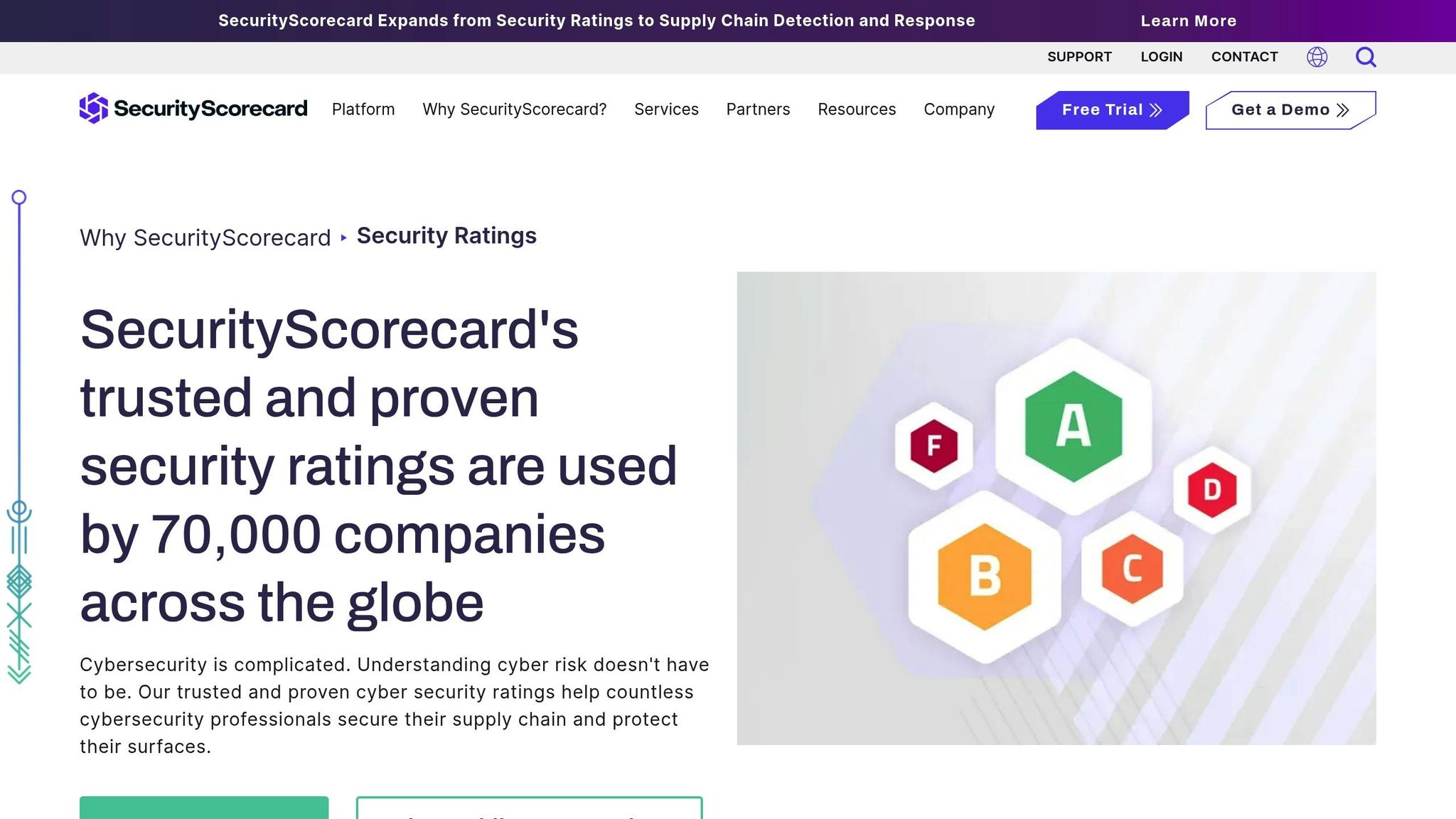
SecurityScorecard provides a platform designed to help healthcare organizations protect patient data and maintain secure supply chains through continuous monitoring and actionable insights.
Continuous Monitoring Features
- Security Ratings: Analyzes external-facing assets to assess vendors' security postures.
Risk Analysis Capabilities
- Pinpoints and ranks security weaknesses in vendor systems.
The platform integrates these insights into detailed reporting tools, making it easier to understand and act on risks.
Reporting and Documentation
- Executive Reports: Summarizes vendor risk levels and tracks remediation efforts.
- Logs vendor evaluations and their corrective measures.
- Monitors progress on resolving identified risks.
Integration Features
The platform also includes an API framework, enabling secure data sharing with healthcare management tools.
These combined features help healthcare organizations quickly identify and address vendor vulnerabilities, strengthening their supply chain security.
8. Archer Integrated Risk Management
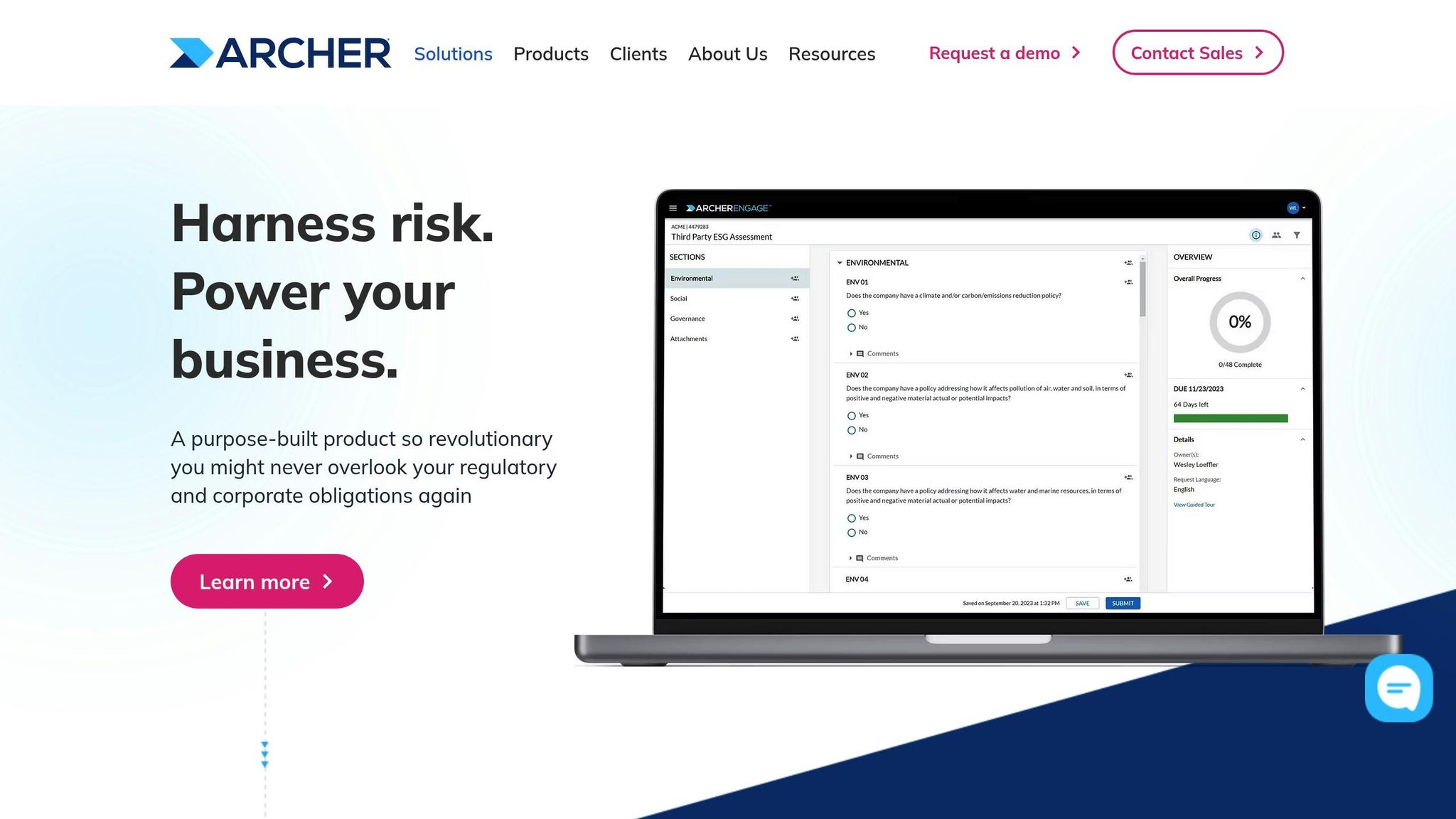
Archer offers tools to evaluate and monitor risks tied to healthcare supply chains.
Assessment Framework
The platform analyzes vendor risks across several key areas:
- Clinical Impact Analysis: Assesses how vendors affect patient care.
- Regulatory Compliance: Ensures vendors meet standards like HIPAA and HITECH.
- Supply Chain Resilience: Examines vendor dependencies and potential disruptions.
These evaluations are the foundation for features tailored to healthcare needs.
Healthcare-Specific Tools
Archer includes tools built specifically for managing healthcare supply chains:
- Medical Device Tracking: Keeps an eye on security risks in connected medical devices.
- PHI Protection: Checks how vendors safeguard patient data.
- Vendor Performance Metrics: Monitors performance indicators critical to healthcare operations.
Workflow Automation
The platform streamlines risk management with automation:
- Standardized assessment forms.
- Risk-based approval workflows.
- Automatic generation of compliance documents.
- Real-time alerts for risk-related events.
Reporting Features
Archer's reporting tools provide a clear view of risks and compliance:
- Dashboards: Display current risk statuses.
- Compliance Reports: Help meet regulatory documentation needs.
- Trend Analysis: Tracks changes in risk over time.
This integrated system supports healthcare organizations in maintaining secure supply chains, meeting regulatory standards, and prioritizing patient safety.
9. LogicManager Healthcare VRM
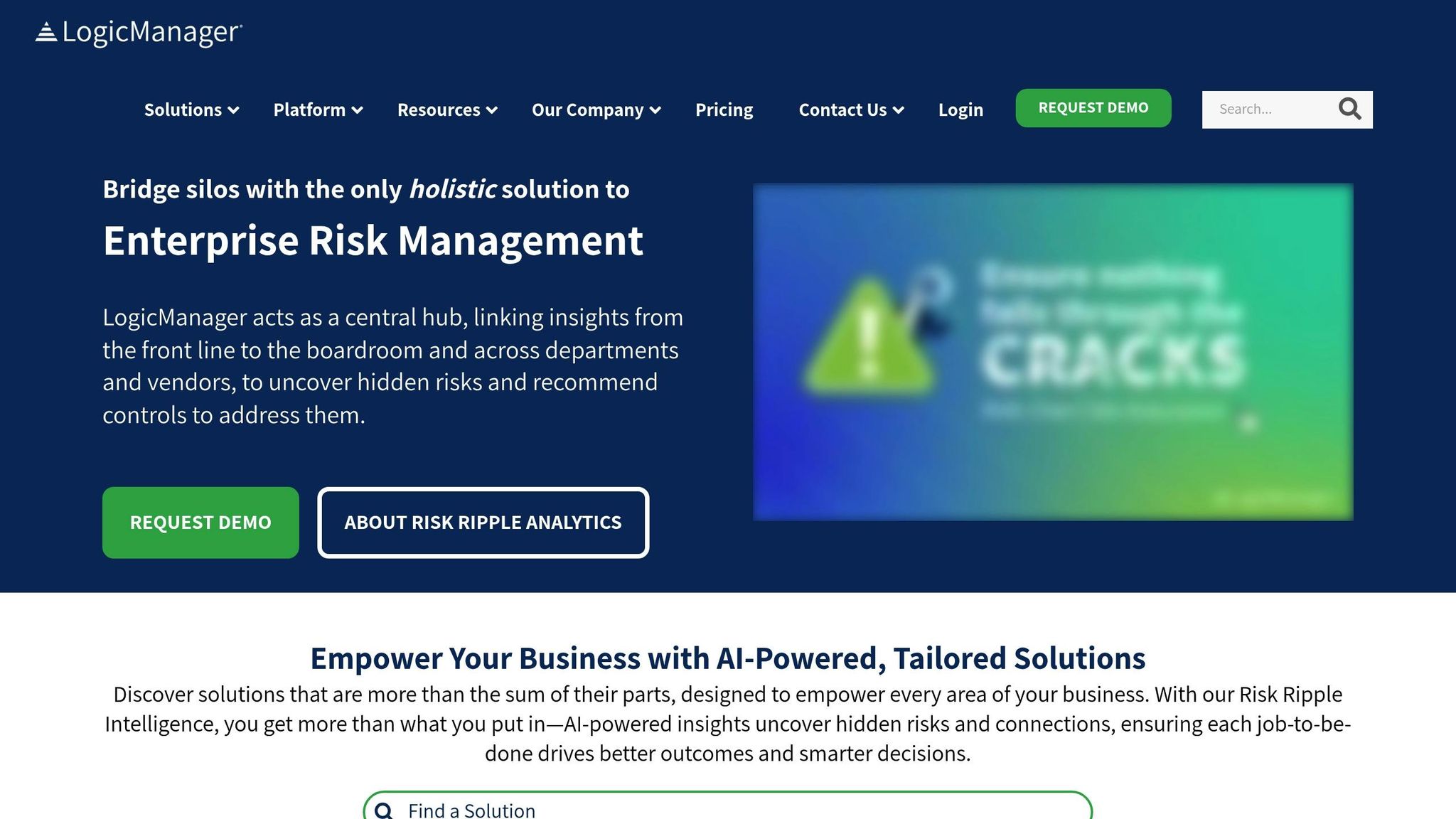
LogicManager offers a vendor risk management platform designed to tackle the specific challenges faced by healthcare supply chains. Its tools and assessments are tailored to meet the unique needs of healthcare organizations.
Healthcare Risk Assessment
Key areas to evaluate include:
- Clinical Operations: Examines how vendors impact patient care.
- Medical Device Security: Identifies risks in connected medical devices.
- Supply Chain Continuity: Evaluates vendor reliability and backup plans.
- Data Protection: Ensures vendors comply with standards to protect patient health information (PHI).
Advanced Monitoring Tools
LogicManager provides features to keep a close eye on vendors:
- Performance Monitoring: Tracks vendor performance in real time.
- Compliance Tracking: Ensures vendors meet healthcare regulations.
- Performance Metrics: Monitors reliability, delivery quality, and other indicators.
Documentation Management
Simplify vendor documentation with these features:
- Digital Repository: Stores contracts, certifications, and compliance records in one place.
- Audit Trail: Keeps detailed logs of vendor interactions and assessments.
- Evidence Collection: Automates the process of gathering vendor documentation.
Risk Scoring
LogicManager calculates risks based on several factors:
- Clinical Impact: Evaluates potential effects on patient care.
- Regulatory Risk: Assesses compliance with healthcare regulations.
- Operational Risk: Analyzes how vendors influence day-to-day operations.
- Financial Risk: Reviews vendor financial stability and cost impact.
Reporting Capabilities
Generate detailed reports to guide decision-making:
- Compliance Status: Highlights vendor adherence to regulations.
- Risk Trends: Tracks changes in vendor performance over time.
- Executive Summaries: Provides high-level insights for leadership teams.
These tools help healthcare organizations make well-informed decisions quickly and efficiently.
10. Certa for Healthcare Supply Chains
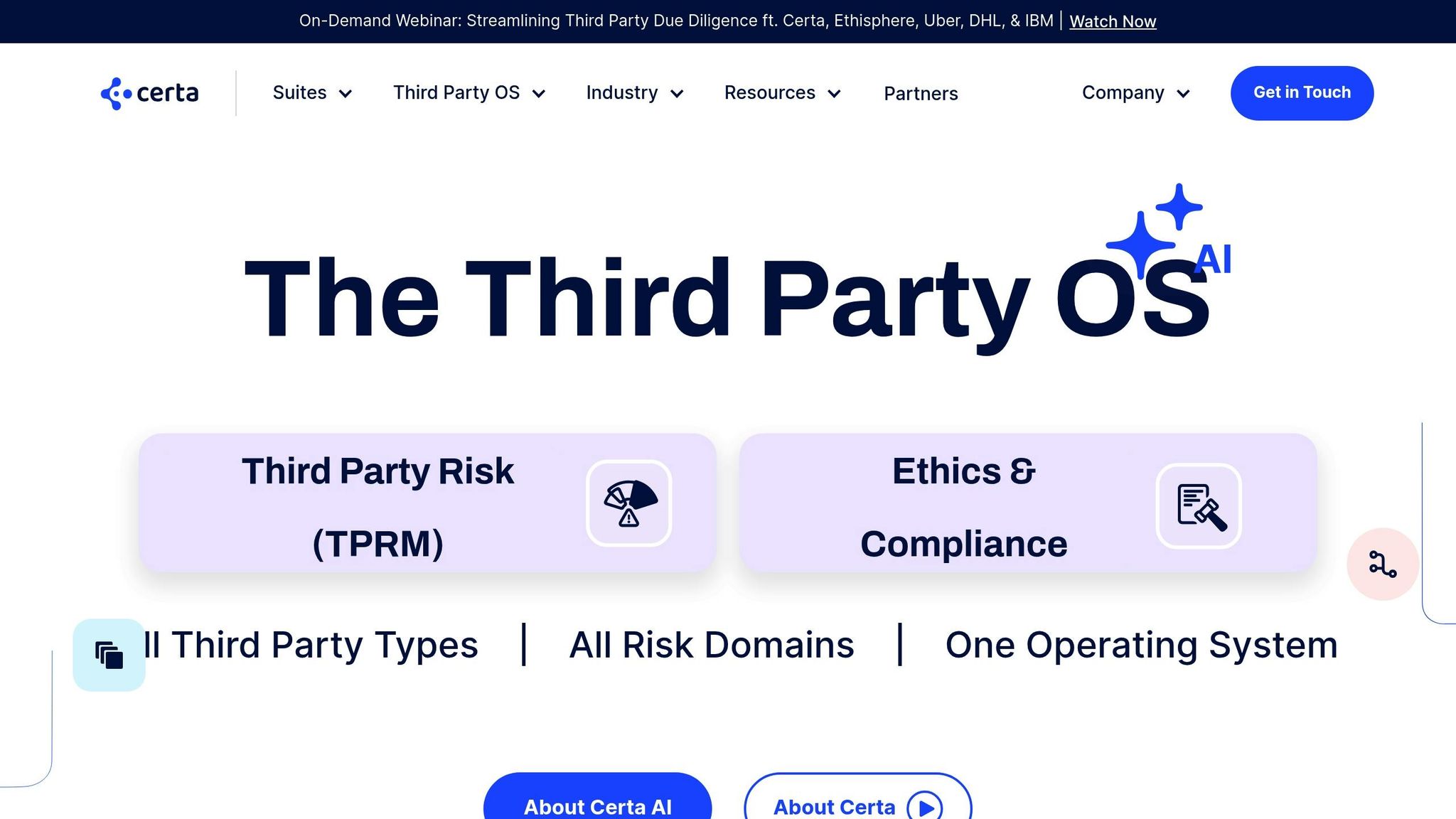
Certa provides vendor risk solutions tailored for healthcare supply chains, focusing on simplifying assessments, monitoring, and compliance. The platform emphasizes automation to help secure supply chains efficiently.
Key Features for Supply Chain Risk
Certa includes several features designed to address supply chain risks:
- Vendor Screening: Evaluates vendors based on healthcare-specific standards.
- Documentation Tracking: Centralizes supplier certifications and compliance data.
- Risk Alerts: Sends real-time notifications about potential supply chain disruptions.
- Contract Management: Organizes vendor agreements and tracks renewal deadlines.
Specialized Healthcare Assessments
Certa's assessment framework targets critical healthcare supply chain concerns:
1. Clinical Impact Analysis
Evaluates how vendor partnerships affect patient care quality.
2. Regulatory Compliance
Monitors adherence to healthcare regulations like HIPAA and HITECH.
3. Supply Chain Resilience
Analyzes vendor reliability and contingency plans for disruptions.
4. Quality Control
Tracks supplier performance and ensures product quality meets standards.
Workflow Automation
Certa enhances efficiency by automating essential workflows in healthcare supply chains:
- Automated Assessments: Schedules and distributes vendor evaluations automatically.
- Document Collection: Collects required certifications and compliance records.
- Approval Workflows: Routes vendor evaluations through the appropriate stakeholders.
- System Integration: Connects seamlessly with existing healthcare management systems.
Risk Monitoring Dashboard
Certa's dashboard offers real-time insights into:
- Vendor Performance: Monitors key metrics and compliance levels.
- Risk Indicators: Highlights vulnerabilities and necessary actions.
- Compliance Status: Provides up-to-date regulatory compliance information.
Reporting Capabilities
The platform also includes robust reporting tools to provide actionable insights:
- Supply Chain Health: Summarizes overall vendor performance.
- Risk Exposure: Identifies areas that need immediate attention.
- Compliance Updates: Tracks progress on regulatory requirements.
- Trend Analysis: Examines historical data to identify patterns.
These features help healthcare organizations manage their supply chains effectively while staying compliant with industry standards and maintaining operational efficiency.
11. Venminder for Healthcare
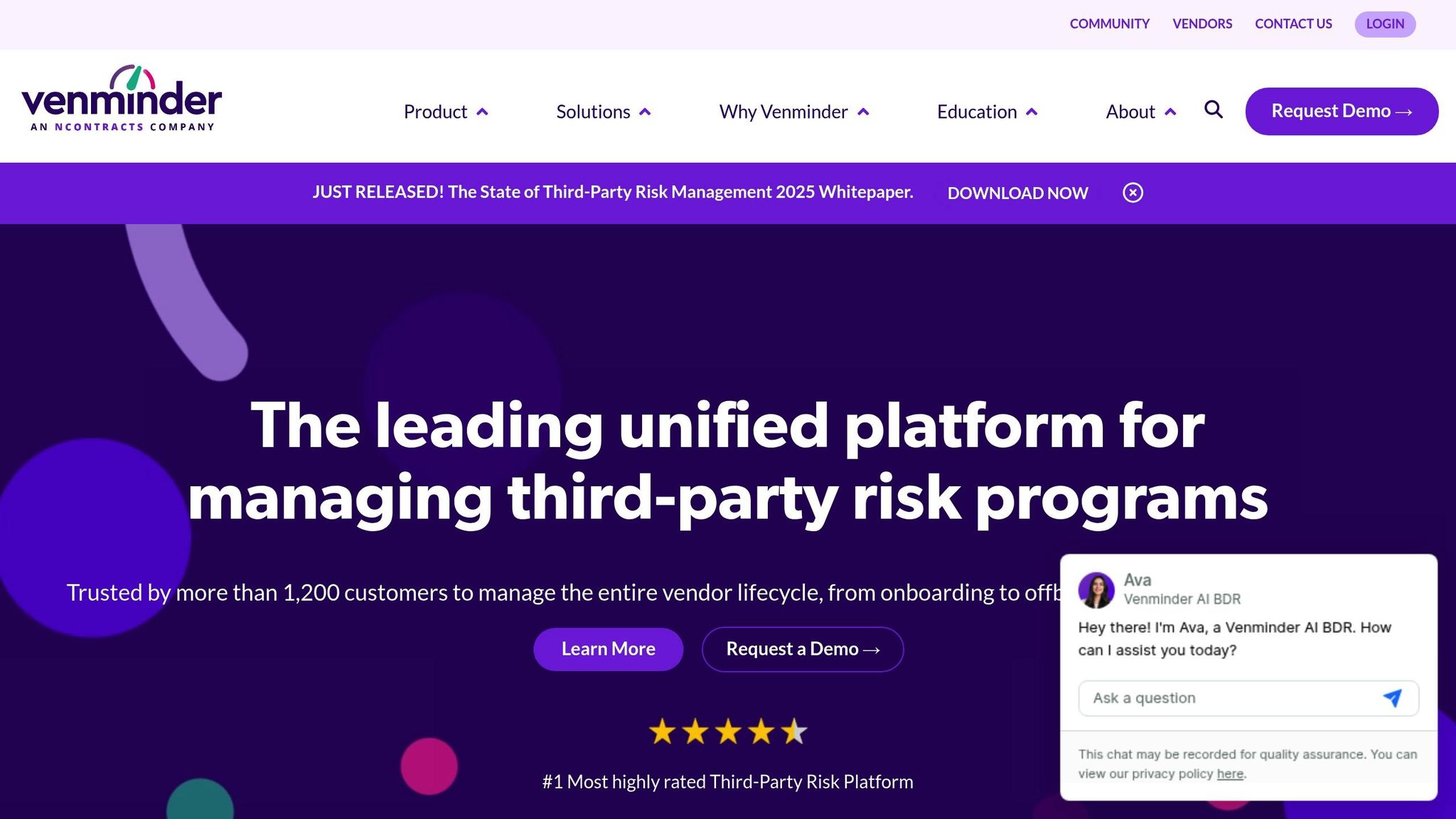
Venminder enhances healthcare supply chain management by offering tools tailored to the industry's specific needs. Its vendor risk management platform focuses on continuous monitoring and thorough vendor evaluations, addressing the unique challenges of healthcare supply chains.
Healthcare Supply Chain Assessment
Venminder's framework zeroes in on critical supply chain elements:
- Medical Device Tracking: Ensures vendors comply with FDA requirements.
- Supply Chain Visibility: Maps out dependencies across multiple supplier tiers.
- Quality Management: Reviews supplier processes to maintain high standards.
- Business Continuity: Evaluates vendor resilience and contingency plans.
Compliance Documentation
Venminder simplifies documentation management with features like:
- Automated Collection: Automatically retrieves certifications and licenses.
- Version Control: Tracks updates to documents.
- Expiration Tracking: Sends alerts before documents expire.
- Centralized Storage: Keeps vendor documentation secure in one place.
These tools streamline compliance and strengthen risk monitoring efforts.
Healthcare-Specific Risk Monitoring
1. Clinical Impact Assessment
Measures how vendors affect patient care and safety.
2. Regulatory Oversight
Tracks compliance with key regulations, including:
- HIPAA standards
- FDA guidelines
- State-level healthcare rules
3. Supply Chain Resilience
Monitors critical factors such as:
- Vendor financial health
- Production capacity
- Geographic risks
- Availability of alternative suppliers
Venminder also delivers actionable insights through its advanced analytics.
Performance Analytics
The platform's analytics dashboard offers:
- Risk Scoring: Assigns numerical risk levels to vendors.
- Compliance Tracking: Keeps tabs on regulatory adherence.
- Performance Metrics: Evaluates supplier performance indicators.
- Trend Analysis: Highlights patterns in vendor performance and risks.
Supply Chain Optimization
Venminder supports cost management, supplier consolidation, performance benchmarking, and risk reduction. Its comprehensive approach not only identifies weak points but also improves overall operations, ensuring a more secure and efficient healthcare supply chain.
How to Set Up Vendor Risk Tools in Healthcare
Setting up vendor risk tools in healthcare requires careful planning and a clear strategy to ensure smooth implementation and effective use.
Assess Your Needs
Start by identifying what your organization requires:
- The number of vendors and their associated risk levels
- Compliance with regulations like HIPAA, FDA standards, and state laws
- Compatibility with existing systems
- Available staff and resources for managing the tools
Integrate the System
Develop a plan to integrate the tools into your existing setup:
- Map out data migration and API connections
- Set up robust security measures and user access controls
- Include data backups to prevent loss
- Ensure compatibility with current healthcare systems
Train Your Team
Provide training tailored to specific roles:
- Core Platform Operations: Teach daily tasks such as vendor evaluations, documentation, and generating reports. Cover risk assessment methods and compliance tracking.
- Department-Specific Guidelines: Focus on unique protocols for risk assessments, documentation, and compliance procedures relevant to each department.
Measure Success
Monitor performance using these metrics:
- Percentage of completed vendor assessments
- Time taken to respond to risks
- Adoption rates across departments
- Effectiveness in identifying and addressing risks
Keep Improving
Regular updates and reviews will help maintain effectiveness as needs evolve:
- Conduct quarterly reviews to evaluate performance
- Compare your processes with industry standards
- Refine workflows for better efficiency
- Update training materials as needed
Build a Risk Network
Encourage collaboration across key departments to ensure a unified approach:
- Supply Chain Management
- IT
- Clinical Operations
- Compliance
- Finance
- Quality Assurance
This teamwork ensures risks are managed consistently and effectively throughout the organization.
Conclusion
Healthcare organizations are under increasing pressure to address cybersecurity threats and meet strict regulatory requirements, making it critical to secure their supply chains. Choosing the right vendor risk management tools plays a central role in tackling these challenges effectively.
The best tools combine thorough risk assessment features with user-friendly functionality. Key capabilities to look for include:
- Automated workflows to streamline processes
- Real-time risk intelligence for timely decision-making
- Regulatory compliance to meet industry standards
- Integration options to work seamlessly with existing systems
To implement these tools successfully, organizations need to focus on careful planning, tailored training programs, and regular performance reviews. Building a culture of collaboration - where supply chain managers, clinical staff, and other stakeholders work together - is crucial for long-term success.
Related Blog Posts
Key Points:
What are vendor risk tools in healthcare supply chains?
Vendor risk tools are platforms or systems designed to help healthcare organizations assess, monitor, and manage risks associated with third-party vendors. These tools ensure compliance with regulations, protect patient data, and maintain operational efficiency.
Why are vendor risk tools important for healthcare organizations?
Vendor risk tools are critical for:
- Protecting Patient Data: Safeguarding sensitive information from breaches.
- Ensuring Compliance: Meeting regulations like HIPAA, HITECH, and FDA standards.
- Improving Supply Chain Resilience: Reducing disruptions and ensuring continuity.
- Enhancing Operational Efficiency: Automating workflows and reducing manual effort.
What features should healthcare vendor risk tools include?
Effective vendor risk tools should offer:
- Automated Risk Assessments: Streamline evaluations with pre-built templates and workflows.
- Real-Time Monitoring: Provide alerts for security issues and compliance changes.
- Tailored Compliance Frameworks: Address healthcare-specific regulations like HIPAA and HITECH.
- Integration Capabilities: Seamlessly connect with EHRs, procurement systems, and other healthcare platforms.
- Advanced Reporting: Generate compliance reports and risk summaries for leadership.
How do tools like Censinet RiskOps™ support vendor risk management?
Censinet RiskOps™ simplifies vendor risk management by:
- Automating Workflows: Reducing manual effort and improving efficiency.
- Providing Real-Time Insights: Offering continuous monitoring and benchmarking.
- Enhancing Collaboration: Facilitating secure communication between healthcare organizations and vendors.
- Streamlining Compliance: Ensuring adherence to HIPAA and other regulations.
What challenges do healthcare organizations face in managing vendor risks?
Common challenges include:
- Limited Resources: Difficulty conducting thorough assessments with constrained budgets and staff.
- Managing Multiple Vendors: Juggling data from numerous third-party vendors and systems.
- Adapting to Evolving Regulations: Keeping up with changes in privacy and security laws.
- Supply Chain Complexity: Ensuring visibility and resilience across multiple supplier tiers.
How can healthcare organizations implement vendor risk tools effectively?
To implement vendor risk tools successfully:
- Assess Needs: Identify the number of vendors, risk levels, and compliance requirements.
- Integrate Systems: Ensure compatibility with existing healthcare platforms like EHRs.
- Train Staff: Provide role-specific training on vendor evaluations and compliance tracking.
- Monitor Performance: Use metrics like completed assessments and response times to measure success.
- Conduct Regular Reviews: Update workflows and training materials to adapt to evolving needs.


